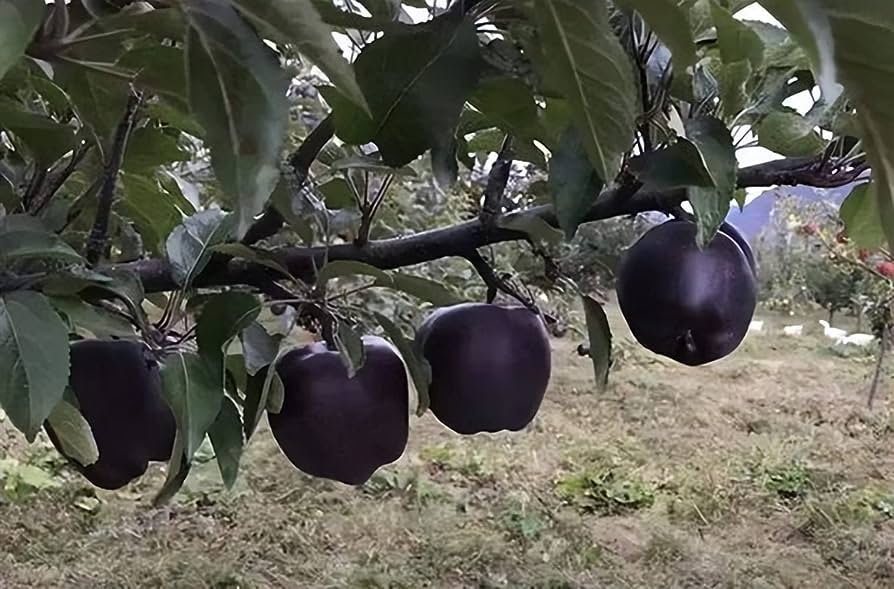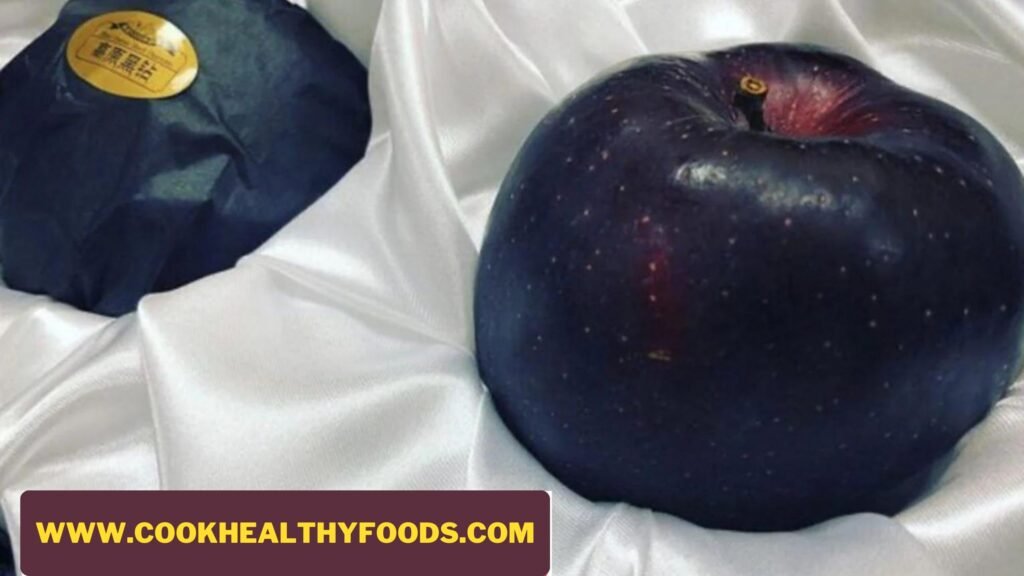
When it comes to popular fruits eaten around the world, apple tops the chart as its rich in fiber and other nutrients, and this is why doctors often advise on consuming an apple a day for good health. Apples are mostly found in 3-4 colors – red, green, golden/yellow, and white. All these apple varieties have unique taste profile with different benefits. But there is a variety of apples that many people don’t know about, and in this stream a unique and rare variety is Black diamond apple but have you heard it before “What is Black Diamond Apple and Why is it So Expensive? “
Overview of Black diamond Apple
In the spotlight is the extraordinary ‘Black Diamond Apple,’ also recognized as the Obsidian Apple, an uncommon and exclusive cultivar originating from the mountainous regions of Tibet. Its exceptional dark purple-to-black exterior distinguishes it from other apple varieties, contributing to its unique visual charm. Slicing open this remarkable apple reveals a crisp and juicy flesh, showcasing a captivating range of colors, transitioning from vibrant shades of red to a mesmerizing maroon hue. The Black Diamond Apple is more than just a fruit; it’s a sensory experience, offering a visual feast and a burst of flavors.
Why this apple is called Black diamond apple ?

The Origin of the “Black Diamond Apple”
The captivating name “Black Diamond Apple” finds its origin in the enchanting coloration brought about by a unique blend of geographical factors and climatic conditions in Nyingchi, a small mountainous city in Tibet. Experts attribute the distinct dark hue of the apple to the region’s exposure to excessive ultraviolet light during the day and significant temperature fluctuations at night. While the skin takes on a darker shade, the flesh inside remains white and bright, akin to other apple varieties.
Rarity of black diamond apple
The Black Diamond Apple, a rare variant within the Huaniu apple family, thrives in the Tibetan region of Nyingchi. Despite its name, the apple boasts a distinctive purple hue, complemented by white pulp on the inside. The extraordinary coloration can be attributed to the region’s lofty altitude, exceeding 3,500 meters. Here, the temperature undergoes drastic fluctuations between day and night, subjecting the apples to ample ultraviolet light, resulting in their dark skin.

Positioned in the high-end market segment, the average Black Diamond Apple finds its place on the shelves of upscale supermarkets, commanding a price tag of approximately 7.75 USD. However, cultivating these apples poses challenges for many farmers. The Black Diamond apple trees require up to eight years to attain maturity, and the growing season is notably brief, lasting only about two months. These factors contribute to the reluctance among farmers to embrace the cultivation of this unique fruit.
Nutritional value of Black diamond apple
The Black Diamond Apple may not exhibit as high nutritional values as typical apples in terms of fiber, vitamins C, and vitamins B. Nevertheless, it offers unique health benefits:

- Antioxidant Defense: Black Diamond Apples are effective in preventing the damaging effects of free radicals, directly associated with premature aging, wrinkles, age spots, and various age-related conditions.
- Digestive Support: Packed with pectin, a type of fiber acting as a prebiotic, Black Diamond Apples aid digestion by maintaining bowel regularity. They support healthy digestive function and enhance the activity of beneficial bacteria in the large intestine.
- Metabolism Improvement: Rich in Riboflavin, Vitamin B12, vitamins B, and vitamins C, Black Diamond Apples aid in breaking down carbohydrates, fats, and proteins, facilitating energy production. This contributes to the formation of red blood cells, iron absorption, and the maintenance of a healthy central nervous system.
- Bone Health Promotion: The significant Vitamin C content in Black Diamond Apples contributes to strong bones, preventing diseases like osteoporosis, osteoarthritis, and bone cancer.
- Skin Wellness: The antioxidants in Black Diamond Apples address skin conditions such as psoriasis, eczema, rosacea, and herpes. Vitamin C enhances blood circulation, maintaining youthful and toned skin. It also combats acne-causing bacteria, aids in repairing damaged skin, and accelerates the healing of wounds, burns, and frostbite.
- Heart Disease Prevention: Soluble fiber and polyphenol antioxidants in Black Diamond Apples promote heart health, reduce blood pressure, prevent arterial build-ups, and enhance blood flow to the heart.
- Weight Management: Dietary fiber in Black Diamond Apples helps decrease cholesterol levels, lower blood pressure, and reduce inflammation. The high water content increases satiety, curbing appetite and preventing overeating.
- Diabetes Management: Black Diamond Apples regulate blood sugar, protect against diabetes, and lower fasting glucose levels. Polyphenols in these apples are linked to reducing carbohydrate uptake and stimulating insulin release.
- Oral Health Benefits: The fiber texture of Black Diamond Apples stimulates saliva secretion, reducing bacterial growth in the mouth and cleaning trapped plaque between teeth.
- Infection Protection: Black Diamond Apples possess antibacterial properties that safeguard against various harmful bacteria and fungal infections. They also combat inflammation and cell damage.
- Vision Enhancement: Rich in vitamin A, Black Diamond Apples help prevent age-related vision problems like macular degeneration and cataracts.
- Energy Boost: Despite containing a significant calorie count, Black Diamond Apples induce a feeling of fullness, decrease appetite, and help maintain lower body weights.
- Immunity Support: The consumption of Black Diamond Apples strengthens the immune system, thanks to their rich antioxidant content. This enhances the strength of immune cells and increases the body’s ability to fight infections.
In essence, the Black Diamond Apple’s rarity, distinct color, and premium market positioning come at the cost of extended cultivation periods and limited growing windows, making it a unique but challenging venture for both producers and consumers alike.
History of Black diamond apple
As the history of the Black Diamond Apple continues to unfold, it remains a testament to the intersection of nature and cultivation, creating a fruit that not only tantalizes the taste buds but also captivates with its rich history and distinctive characteristics.
Why the Black diamond apple is so expensive?
The costliness of the Black Diamond Apple can be attributed to several factors that contribute to its unique and exclusive nature:

- Limited Cultivation: Black Diamond Apples are grown in specific, carefully controlled environments, often in regions with precise climate conditions. This limited cultivation adds to the scarcity of the fruit.
- Specialized Growing Conditions: The cultivation process for Black Diamond Apples requires meticulous attention to detail. The apples thrive in unique conditions that are not easily replicable, making the cultivation process more labor-intensive and challenging.
- Harvesting Challenges: The harvesting of Black Diamond Apples is a delicate process. The fruit needs to be handpicked to avoid damage, contributing to the overall cost of production.
- Rarity and Demand: Given the limited supply of Black Diamond Apples, coupled with their distinct visual appeal and flavor profile, there is a high demand for these apples in niche markets. This rarity and demand naturally drive up the price.
- Culinary Excellence: Black Diamond Apples are often considered a gourmet delicacy. Their use in high-end culinary creations and fusion dishes adds to their perceived value, making them sought after by chefs and food enthusiasts willing to pay a premium.
- Global Recognition: The global recognition of Black Diamond Apples as a unique and exotic variety further contributes to their elevated price. Consumers often associate higher value with items that are rare and globally acknowledged.
- Transportation and Distribution: The delicate nature of Black Diamond Apples requires special care during transportation and distribution. The costs associated with maintaining the quality of the fruit throughout the supply chain contribute to the overall expense.
- Cultural and Symbolic Significance: The cultural and symbolic significance of Black Diamond Apples in certain traditions and regions adds to their allure. This cultural value can influence the perceived worth of the apples.
